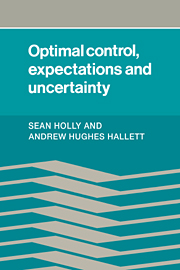Book contents
- Frontmatter
- Contents
- Preface
- 1 Introduction
- 2 The theory of economic policy and the linear model
- 3 Optimal-policy design
- 4 Uncertainty and risk
- 5 Risk aversion, priorities and achievements
- 6 Non-linear optimal control
- 7 The linear rational-expectations model
- 8 Policy design for rational-expectations models
- 9 Non-cooperative, full-information dynamic games
- 10 Incomplete information, bargaining and social optima
- Notes
- References
- Index
7 - The linear rational-expectations model
Published online by Cambridge University Press: 17 September 2009
- Frontmatter
- Contents
- Preface
- 1 Introduction
- 2 The theory of economic policy and the linear model
- 3 Optimal-policy design
- 4 Uncertainty and risk
- 5 Risk aversion, priorities and achievements
- 6 Non-linear optimal control
- 7 The linear rational-expectations model
- 8 Policy design for rational-expectations models
- 9 Non-cooperative, full-information dynamic games
- 10 Incomplete information, bargaining and social optima
- Notes
- References
- Index
Summary
INTRODUCTION
In the econometric model used in the first part of this book it was assumed that economic agents did not base their behaviour upon anticipations of the future; or if they did the process by which they revised their expectations was largely mechanical. This means that economic systems could be treated in principle in an analogous fashion to physical and engineering systems. Economic agents could be treated more or less as automata responding in a regular and reasonably predictable way to stimuli.
Recently the basic theory relating to the behaviour of the economy, especially at the macroeconomic level, has changed. The emphasis has shifted from an essentially backward-looking to a forward-looking perspective. This shift is associated with the rational-expectations hypothesis.
Initially the introduction of forward-looking expectations into macroeconomic models appeared to have serious implications for optimal-control theory. In particular, the neutrality proposition of Sargent and Wallace (1975) suggested that there is no systematic role for a stabilisation policy when expectations are rational. The generality of this proposition has been challenged and it is now recognised that even when expectations are forward-looking it is still possible for a stabilisation policy to have a systematic effect on economic activity. However, this does not leave optimal-control theory unaffected, because the forward-looking ‘acausal’ nature of the economy means that the standard policy-design techniques brought over from engineering are no longer applicable.
- Type
- Chapter
- Information
- Optimal Control, Expectations and Uncertainty , pp. 117 - 147Publisher: Cambridge University PressPrint publication year: 1989



